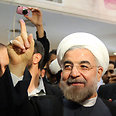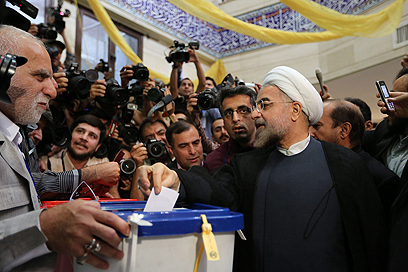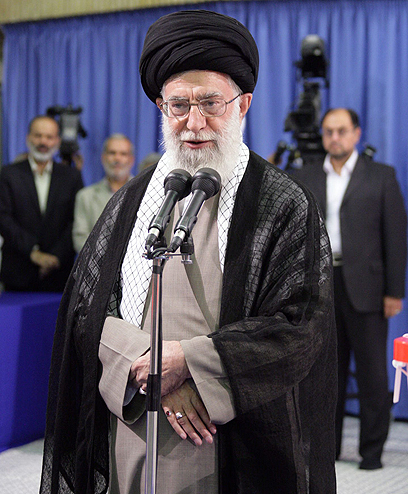
Beware of Rohani's trap
Analysis: Israel must make certain Obama, Ashton are not dazzled by seemingly moderate Iranian president-elect
The surprising victory in the Iranian presidential elections of Hassan Rohani, who is considered relatively moderate, is a reason for cautious optimism within the Islamic Republic and in the West. The fact that millions and millions of people voted for Rohani indicates that the economic sanctions imposed by the West are hurting the citizens, who view them as the main cause for the dire economic situation in Iran.
The election results also show there is a large pragmatic camp in Iran that includes not only the supporters of the reformists, but also those who support the conservative movement but prefer an improvement in the economic situation through the lifting of sanctions rather than the continued enrichment of uranium and installment of centrifuges.
This was exactly what Rohani proposed during his televised debate with rival candidates, and this also appears to be a priority of the Iranian people at this time. The fact that his comments were broadcast on television, uncensored, indicate that perhaps this is also the position of Supreme Leader Khamenei, who wants to prepare the Iranians for a possible twist in the nuclear negotiations with the West.
Another reason for optimism is the impressive democratic manner in which the elections were conducted. This indicates that the ayatollahs' regime and the Revolutionary Guard are attentive to their subjects and have drawn lessons from the riots of 2009. It is not fear of the "green" reformists which dictated the cautious conduct of Khamenei and the Revolutionary Guard this time around, but a genuine fear for their survival due to the possibility that the economic collapse may lead even their supporters to rise up against them.
It is safe to assume that Rohani, like his predecessors, will eventually implement the decisions handed down by Supreme Leader Khamenei. So why has his victory sparked so much optimism in Iran and the West? If the elected president is merely a puppet tied to the strings pulled by the supreme political and religious leader, why should we even bother analyzing the election results? Because the president is not only an important and influential figure among the decision makers who are closest to Khamenei, he is also the head of the regime's executive branch, and as such he determines the quality and pace of the implementation of the policy set by Khamenei. Among other things, the president dictates the economic policy and the methods for implementing reforms. He also appoints people to senior executive positions and controls Iran's budget, answering only to Khamenei and Parliament. Meaning, he is a very influential figure who may, at times, challenge the supreme leader's authority – as Ahmadinejad had done on occasion.

Still willing to cooperate? Rohani votes (Photo: MCT)
Israel and the West are most interested in seeing how Rohani's election will affect Iran's military nuclear program. What is almost certain is that his election will allow the regime in Tehran to buy some more time. The West will want to give Rohani an opportunity to establish his political authority, declare his new, much-needed economic policy and consult with Khamenei regarding Iran's position in the next round of nuclear talks with the six world powers. Therefore, US President Obama and the European leader may decide on a moratorium, which would give Rohani more time to get organized and attain power. Such a delay, which would be limited in time, would mean that the West would refrain from imposing additional sanctions on Iran or tightening the existing ones. The West may also accept Iran's proposal to postpone the next round of nuclear talks.

Pulls the strings. Khamenei (Photo: FP PHOTO / HO / KHAMENEI.IR)
In the meantime, the centrifuges are already spinning. Additional centrifuges, which have already been installed, will become operational soon, and in the future more advanced centrifuges, which enrich uranium at three times the current pace, will also be installed. Rohani will settle into his new position and gain power within months, and during this time Iran will become a country on the brink of nuclear weapons capability. What will happen after that – God only knows.
Another possibility is that Rohani will employ a tactic that is similar to the one employed by his former boss. When the Americans invaded Iraq in 2003 and got close to the Iranian border, then-president Mohammad Khatami did not take any chances and suspended the uranium enrichment process, as well as the weapons development program (at least this is what the Americans claimed. The IDF's intelligence branch said Iran had not really suspended these programs).
At the time, Rohani served as Khatami's chief nuclear negotiator with the West. He represented moderate Iran, and, like today, was willing to cooperate and reach a compromise. But in 2005, when the Iranians saw that the Americans were buried up to their necks in the Iraqi mud, they resumed their nuclear program, including weapons development, without blinking. We may see this happen again. Rohani will agree to slow down the race toward a nuclear bomb in exchange for the lifting or easing of Western sanctions, and after a while, at Khamenei's order, the uranium enrichment will resume with full force. It is hard to see the West and the Security Council imposing all of the sanctions again. Russia and China will make certain this does not happen.
There is also a third possibility: During the next round of nuclear talks Iran may suggest a compromise similar to the one proposed by the West, but it will have enough loopholes in it that Iran would still be able to advance toward becoming a country on the brink of nuclear weapons capability. The West, dazzled by Rohani's apparent moderateness, will adopt the proposal and ease the sanctions. Such a development would also delegitimize the Israeli or American military option – until it will be too late.
Therefore, we should be very happy for the Iranian people and for the West, but we must also make certain that Obama and EU Foreign Policy chief Catherine Ashton do not fall into a trap Rohani may set for them at Khamenei's order.










